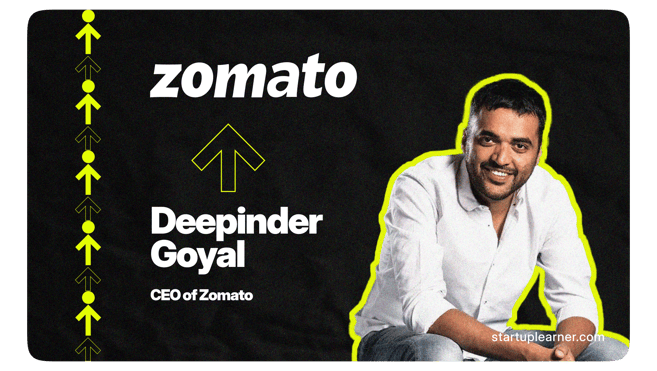Deepinder Goyal: How a Simple Idea for Menus Turned into Zomato's Global Food Empire
FOUNDERS
Startup Learner
4/28/20252 min read



Introduction
Most iconic startup stories start with an observation — and Deepinder Goyal's story is no different.
A frustrating wait for restaurant menus sparked an idea that became Zomato, one of the world’s largest food-tech platforms.
His journey shows how simple ideas, executed relentlessly, can create billion-dollar businesses that change habits and lifestyles.
Early Life and Background
Deepinder Goyal was born in a small town in Punjab, India, in 1983.
He pursued an undergraduate degree in Mathematics and Computing from the Indian Institute of Technology (IIT) Delhi — a premier engineering college in India.
After graduating, he worked as a management consultant at Bain & Company in Delhi.
It was during this time that he spotted the pain point that would change his life.
The Big Idea: Menus on Demand
While working at Bain, Deepinder noticed a common problem:
Employees spent a lot of time hunting for restaurant menus during lunch breaks.
Seeing this repeated daily, he thought — what if all restaurant menus were available online in one place?
In 2008, along with his colleague Pankaj Chaddah, Deepinder launched Foodiebay — a simple website that listed scanned menus from nearby restaurants in Delhi NCR.
The concept clicked almost instantly.
Users loved the convenience. Restaurants loved the exposure.
By 2010, Foodiebay rebranded as Zomato, signaling a bigger ambition: to build a full-fledged food discovery and delivery platform.
Building the Company: From Local Listings to Global Food-Tech
Deepinder led Zomato through multiple phases of growth:
Food Discovery: Listings, menus, photos, and user reviews.
Table Reservations: Helping users book restaurants in advance.
Food Delivery: Entered aggressively in 2015 to compete with players like Swiggy.
Global Expansion: Entered 24 countries, including UAE, Australia, and the UK.
Acquisitions: Acquired players like Uber Eats India to consolidate market share.
Zomato scaled at breakneck speed but also faced intense competition and operational challenges, especially during the delivery wars.
Still, under Deepinder’s leadership, Zomato adapted — pivoting from hypergrowth to profitability-focused strategies post-2020.
In 2021, Zomato became the first Indian food-tech startup to go public, with a hugely successful IPO.
Lessons for Founders
Deepinder Goyal’s startup journey reveals key lessons:
1. Spot everyday problems.
You don't need a breakthrough technology to build a startup — sometimes, solving a simple daily hassle is enough.
2. Start small, move fast.
Foodiebay began as a side hustle. Execution speed was key.
3. Be willing to evolve.
From discovery to delivery to dining — Zomato continuously expanded its value proposition.
4. Compete fearlessly.
Zomato fought head-to-head with Swiggy and global players without backing down.
5. Build for resilience.
Despite losses and market fluctuations, Zomato kept adapting until it reached public markets.
The Impact
Zomato changed how Indians (and millions globally) order food and discover restaurants.
It digitized small restaurants, enabled food delivery jobs, and created an entire food-tech ecosystem across cities.
During the COVID-19 pandemic, Zomato also diversified into grocery delivery and supported frontline initiatives, strengthening its brand goodwill.
Today, Zomato isn't just a food app — it’s a core lifestyle product for millions.
Conclusion
Deepinder Goyal’s story proves that entrepreneurship isn't always about moonshot ideas — it's about relentless execution on real-world problems.
From scanning menus to leading a billion-dollar public company, his journey offers this timeless startup lesson:
Stay close to the user’s pain points, adapt fast, and keep moving forward — no matter the competition.



